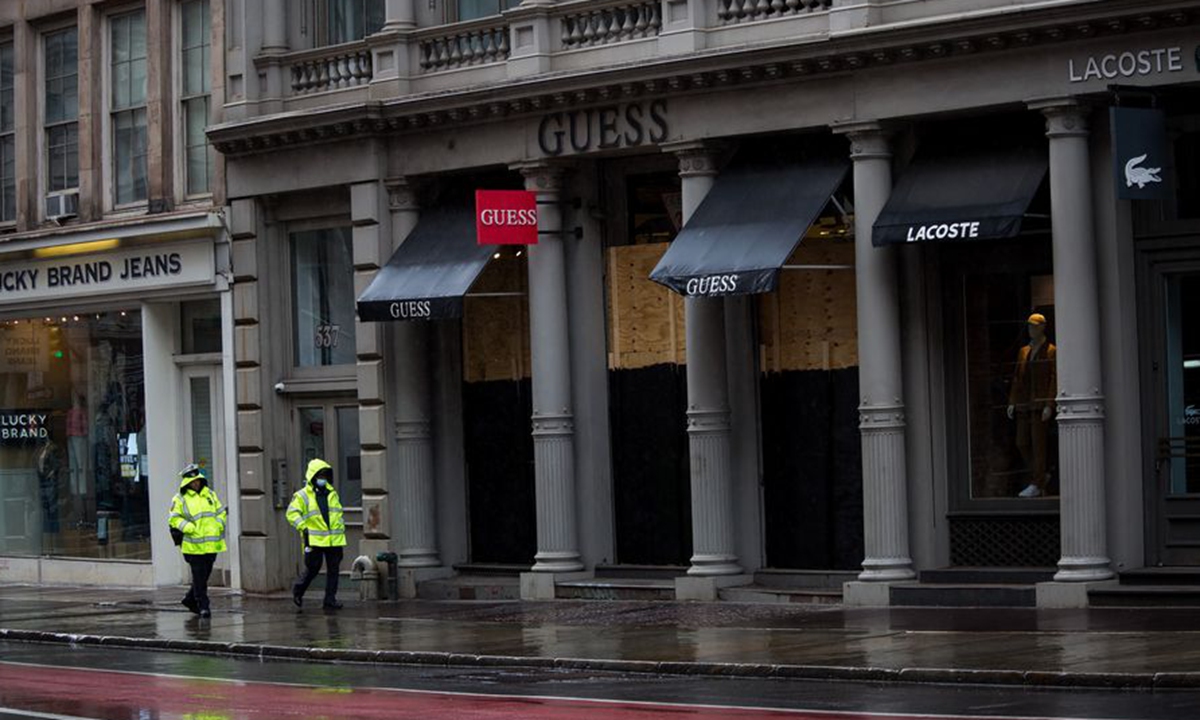
Police officers walk past closed retail stores along Broadway in New York, the United States, on May 8, 2020. New data showed that U.S. employers cut a staggering 20.5 million jobs in April, erasing a decade of job gains since the global financial crisis and pushing the unemployment rate to a record 14.7 percent. While this marks the highest level of unemployment since the Great Depression, analysts said the figure does not capture the full scale of the COVID-19-induced job crisis, and the worst is yet to come. (Photo by Michael Nagle/Xinhua)
New York City - the epicenter of America's coronavirus outbreak - began partially reopening its shattered economy Monday after almost three months of lockdown, as the World Health Organization (WHO) warned the health crisis was "worsening" worldwide.
Some 400,000 New Yorkers were allowed to return to work as retailers began offering limited in-store and curbside pickup, with construction and manufacturing also permitted to resume operations.
As New York entered phase one of its reopening and some of Europe's hardest-hit nations lurched back to a new kind of normal, the WHO reported a record number of new cases globally.
Director-general Tedros Adhanom Ghebreyesus said 136,000 cases had been reported in the past 24 hours, "the most in a single day so far," with the majority of them in the Americas and South Asia.
"Although the situation in Europe is improving, globally it is worsening," he told reporters.
COVID-19 caused more than 21,000 confirmed and probable deaths in New York after America's most populous city quickly became ground zero of the US' epidemic in late March.
Mayor Bill de Blasio hailed the first easing of restrictions but warned residents that they must continue to social distance and wash their hands regularly.
But the reopening effort was stymied by large numbers of high-end stores remaining boarded up following widespread looting during anti-racism protests a week ago.
The start of the economic reboot came a day after de Blasio lifted a controversial week-long curfew he had imposed over the looting.
Governor Andrew Cuomo has urged the thousands of protesters who demonstrated against the police killing in Minneapolis of an unarmed black man, George Floyd, to get tested for COVID-19, fearing they may trigger a surge in coronavirus infections.
In the borough of Queens, rush hour subway trains into Manhattan were slightly busier than in recent weeks, but still nowhere near pre-coronavirus numbers.
Seventy-year-old Brandy Bligen said he was looking forward to dining outside, which will be included in phase two of the reopening alongside barbershops, and expected in a fortnight if cases don't surge.
New York's bars will be allowed to open in phase three, but movie theaters and museums have to wait until phase four, likely in late July and with reduced capacity.
Governments around the world are cautiously peeling back those restrictions to resuscitate their economies while trying to avoid a resurgence of infections.
In Belgium, pubs and eateries flung their doors open, but with social distancing measures in force, while Ireland opened shops and allowed gatherings of six people and limited travel.
AFP




